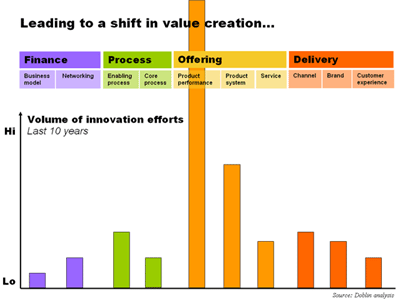|
|
These thoughts and much more were discussed at the recent Consultant Entrepreneur's Forum on Thursday, January 12th, 2006. The following elaborates the purpose of these forums - an idea exchange that aims to benefit the consultants involved and their clients:
Three Categories of Entrepreneur
The term "serial" entrepreneur has been used to describe individuals who launch multiple ventures but don't actually operate nor plan to operate for the long-term. As a result, serial entrepreneurs can be broken down into two categories of leaders: visionaries and managers. There is no doubt that the ability to dream big and initiate is indeed an ability not possessed by everyone. And similarly, the ability to plan and execute isn't an ability possessed by every leader. It's a rare founder that possesses both abilities.
There are several potential drivers of visionary initiative:
1) a form of attention deficit disorder that requires them to constantly be engaged in and stimulated by new and different things in order to be optimally utilized.
2) a need to be in charge and in the spotlight.
3) grand plans to change the world.
Wealth somehow rarely figures into the equation.
Upon closer inspection, it is not uncommon to find that visionaries come from middle-to-upper income households, where creativity was not only considered a source of value and cultivated, but it was also taught how to extract the value from that creativity (1). A desperate need for survival rarely impacts visionary's decisions, often riskier than what managers would undertake. The reason for such risk-taking is actually an overdeveloped sense of self-worth (2) that actually provides an alternative framework for risk-containment.
| Chart 1 |
 |
| Source: Presentation - "Sometimes Things Change" by Larry Keeley of Doblin, Inc. |
Entrepreneurial managers, on the other hand, understand that they don't crank out innovative ideas as prolifically as visionaries do. Those managers are driven primarily by the need for wealth, as they, more than anyone, appreciate that the owner makes all the money, not the manager. As managers, they may be compensated enough to take greater risks, but greed has no limits. Managers' lack of creativity and need for organization prevents them from ever garnering the same passion and loyalty given to visionaries, energies managers crave and visionaries don't always appreciate. Note that these are the ranks from which many consultants spring forth from. This type of consultant parlays their ability to innovate on management processes in order to extract value from their abilities. These are also the ranks from which internal corporate change agents are harvested. It's regrettable that this type of entrepreneur requires more proof (research) than their visionary counterparts in order to convince others (and themselves) that their ideas do indeed have a chance of success. This is why experienced managers practicing entrepreneurship are valued more than those without experience, since they've already proven their ideas at other ventures. This consequently reinforces this group's self-worth - and how they value themselves and take risks.
It's no surprise that, given the introduction, lifestyle entrepreneurs originate from very-low-to-middle income households. As a result, they may not be as creative as visionaries, and are very likely prone to be managers, attempting to emulate the standards of the largest players in the industry they choose to venture into since they lack the planning skills for operating their businesses. This is why 85% of all firms in this country (specifically, those firms with 0-99 employees) gross an average of just over $1 million in sales annually. (3)
In any type of venture, we posit that at least two of the three above-categories of entrepreneur are required for the ongoing viability of any venture. According to Dun & Bradstreet, poor management is the greatest reason for business failure. The Census Bureau says that approximately 66% of new employers survive two years, 50% survive 4 years or more, 40% survive 6 years or more (4). Correlated data between both sources seem to suggest that the greater the starting capital and older the owners, the greater the likelihood of long-term survival. The closer to zero the starting capital and the younger the owners, the greater the likelihood of closure. Of course, education, experience from another business, multiple partners, and access to resources play a role, but interestingly, the data backs up our profiling above: personal reasons for starting a business clearly correlate with its long-term survival.
How Entrepreneurs Innovate
A fascinating quirk about innovation when it comes to entrepreneurship: the innovation is almost always an incremental difference in the attribute of whatever product/service the entrepreneur had experience with prior to launching the venture. Innovation rarely, if ever, occurs in the actual business operation, not surprising, as it is the domain of the managers. But, considering that there are no formal benchmarks other than precedence, it takes an extraordinary level of creativity to launch otherwise.
 |
This theory is evident everywhere, but most recently at an entrepreneur event hosted at the cavernous 101 Club in NY by the NY Enterprise Report in conjunction with sponsors Aetna and 1010Wins in October of last year. The event brought together seasoned entrepreneurs from the NY metropolitan area who shared with us their businesses evolution. A beer producer and distributor, a caterer, an outdoor media company, and a marketing design firm each presented the basics of sales, marketing, accounting, HR, business development, and strategy. But none presented any innovation in how what they've done with their business is anything other than an incremental difference in what a competitor is doing. (Overall, this event merited three pluses "+ + +" on our grading scale.)
Research presented at the recent National Retail Federation Big Show at Javits Center on January 18th by an innovation consulting firm demonstrates (Chart 1) our theory starkly.
After analyzing over 400 businesses, innovation (as defined by the color-coded items), has been concentrated in product and performance. The least most innovated area is the business model and how that model is executed.
It is without modesty and plenty of bias that I can point out here the value of consultants to organizations with an overabundance of ideas focused on the same type of innovation. On another slide, this same innovation consulting firm demonstrates how innovating in the other areas creates higher cumulative value over 10 years, which is great news for our firm's proprietary consultative approach (5), which puts a spotlight on the fundamental business model to advise on innovating it, rather than any other aspect of an enterprise.
(1) "The Irrational Middle Class"
(3) 2002 Statistics of US Businesses; Employment Size of Employer Firms, 1997; al berrios & co. analysis
(4) Redefining Business Success: Distinguishing Between Closure and Failure; doesn't include businesses without employees.
|
|